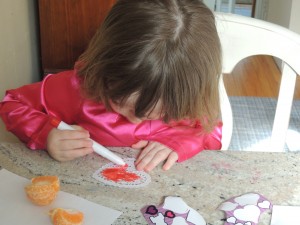Today’s post includes my final installment of answers to George Estreich’s questions. These center around family and education. And I’ll mention here that the drawing to win a free copy of George’s memoir, The Shape of the Eye, will happen on Friday, so comment on my interview with him last week to have a chance at winning this beautiful book.
What has your family’s experience been with Penny’s education? What successes would you like to see shared, and in what ways might current practices change?
Penny has been in an integrated educational setting since she started preschool at age three. From preschool through first grade her classes were team taught by both a special education teacher and a regular education teacher. I’m very grateful for the opportunities she has had to have some individualized instruction (in math, for instance, this year) while also continuing to flourish in her love for reading and writing. Moreover, I believe that both Penny and her peers have benefited from the social learning that occurs as a result of an integrated classroom. Integration breaks down dividing lines, and it ultimately benefits all children because teachers are more equipped to serve a wide array of learning styles and abilities and because students become accustomed to the diversity of ability.
With all this said, we live in Connecticut, which I believe spends the most money per child of every state in the United States. To make this possible elsewhere would take a serious financial investment as well as a cultural shift that acknowledges the personal and social value of putting students of differing intellectual abilities in the same workspace.
Late in A Good and Perfect Gift, you write about “marvelous intentions and misplaced compassion.” I wonder: Has this continued to be true, or do you see changes in the way people react to Penny?
People who have come to know Penny over the years treat her much like we do. They know they should expect her to listen and behave herself and follow directions just like other kids her age. But “misplaced compassion” is still a challenge for us. Penny is still quite small compared to her peers, and she is an expert at singling out adults who will pay attention to her one-on-one. The danger for her is that she won’t grow in her ability to interact with peers and/or to entertain herself.
What dreams do you have for Penny as an adult, and what dreams does she have for herself?
I suspect that Penny will end up in a caring profession—teaching or medicine come to mind. Though I haven’t suggested these possibilities to her, she often says she will be a teacher or a nurse when she grows up. She has a very tender heart towards people with physical ailments, and she loves helping younger children learn.
Penny and her brother William often play-act weddings. Just this morning, he held her “train” as she entered the dining room to get a kiss from her father. He said, “I look forward to the day I get to give you away at the altar.” All this is to say that we dream of a fulfilling social life for Penny—friendships, romantic love and marriage, and a fulfilling job.
Although I suspect that Penny will live independently, I can’t say that’s a dream of mine. I’d be pretty happy to have her around for a long time.
What do you dream for your child?











